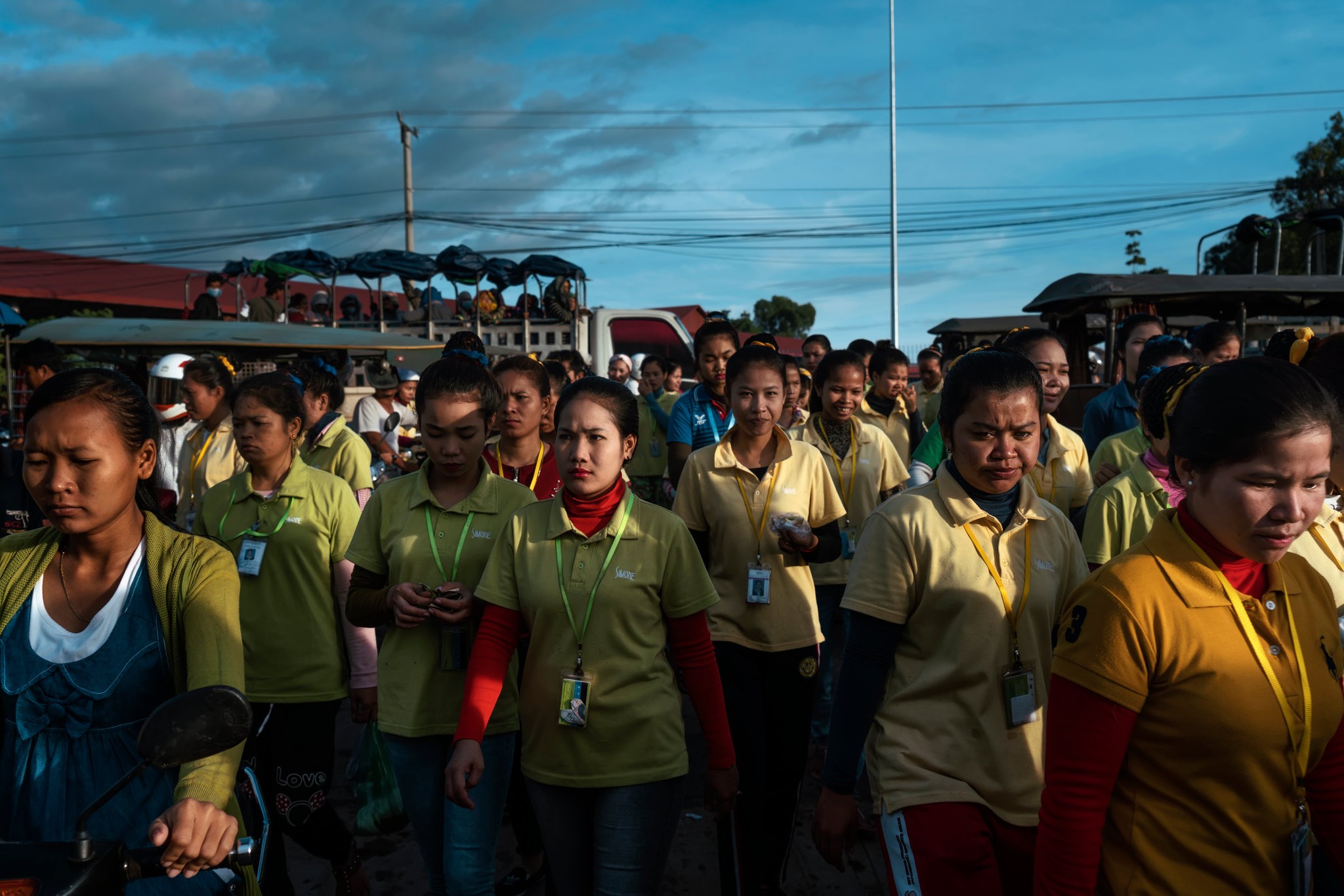
The New York Times reports: "The worsening trade war between the United States and China has intensified pressure on companies to leave China and set up factories in places like Cambodia, a verdant country of 16 million people with low wages and high hopes. But anybody who moves here may have to deal with the water buffalo. Huffing, snorting and in no hurry to move, the big-horned bovines occasionally meander across the Khmer-American Friendship Highway, the dusty, 140-mile route linking Phnom Penh's factories with the port in the coastal city of Sihanoukville. They are not the only potential obstacles. At quitting time, factory workers heading home on foot and motorbikes clog the road. For factory owners on deadline, those crowded roads can mean frustrating delays. "Where Cambodia sits now is where China was 25 years ago," said Piet Holten, who makes the microfiber cloths and bags for sport and fashion sunglass brands like Oakley. To get his sportswear products from his Phnom Penh factory to market, he flies them using DHL. President Trump's tariffs on Chinese products, which expanded to another $200 billion worth of goods on Monday, are prompting many companies to rethink their supply chains. As tariffs begin to make China look more expensive, many companies are considering cheaper places to make their products, like Vietnam, Cambodia, Bangladesh and Ethiopia."
Politico reports: "One man will dominate proceedings at the United Nations General Assembly this week: Donald Trump. But the man who has become, in more ways than ever, the most important man in U.N. politics—Chinese President Xi Jinping—won't be there. While Trump is set to spend three days lecturing other leaders on issues from Iran to the drugs trade, and most will defer to him to avoid embarrassment, America's predominance at the U.N. is weakening—and China is filling the gap. Diplomats in New York see two major political trends reshaping the organization. The first is the U.S. systematically and loudly distancing itself from U.N. bodies and initiatives it doesn't like. The second is the focus with which China is gaining power and influence in Turtle Bay. America's voluble president may own the podium at the General Assembly, but quietly, in the windowless committee rooms of the U.N., Chinese diplomats are busy reshaping the ground rules of international cooperation to Beijing's liking."
The Wall Street Journal reports: "A landmark agreement between the Vatican and China on the appointment of bishops drew sharply divided reaction over the weekend, as global Catholic observers weighed its implications for religious freedom. The Vatican and the Chinese government signed the 'provisional agreement' on Saturday, ending a decadeslong struggle over who chooses the leaders of Catholicism in the world's most populous country. Details of the agreement weren't made public, but people familiar with the matter ahead of the signing said that it allows the pope to veto new nominees for bishops proposed by the Chinese government. The agreement also means that the Vatican will no longer approve the ordination of bishops in China without Beijing's permission, meaning that all new leaders of the Catholic hierarchy there will be men acceptable to an avowedly atheist government. Critics have cast the pact as a capitulation by Pope Francis to Beijing at a time of intensifying government crackdown on Christians and other religious groups."
- 2018-09-21 China 'outraged' by US sanctions over Russian weapons buy
- 2018-09-20 Trump Has Put the U.S. and China on the Cusp of a New Cold War
- 2018-09-19 Trump’s trade war still doesn’t scare China
- 2018-09-18 China's military and economic power 'cannot be denied' and US 'has to make room'
- 2018-09-17 China warns it won’t just play defense in a trade war with the US
- 2018-09-16 A Roadmap for the Great US-China Divorce
- 2018-09-14 U.S. Automakers Are Taking Hits From Both Sides in Trump's Trade War With China
- 2018-09-13 China welcomes US offer of talks as tariffs loom on $200 billion of goods
- 2018-09-12 United States 'deeply troubled' by alleged Chinese crackdown in Xinjiang
- 2018-09-11 China does away with family planning offices
- The New York Times Trump's Tariffs May Hurt, but Quitting China Is Hard to Do
- Politico China Fills a Trump-Sized Vacuum at the U.N.
- The Wall Street Journal Critics Divided on Vatican's Deal With China Over Bishops
- CNN Opposition grows to controversial deal between Beijing and the Vatican
- The New York Times China Is Confronting New U.S. Hostility. But Is It Ready for the Fight?
- The Wall Street Journal U.S. Reliance on Obscure Imports From China Points to Strategic Vulnerability
- The Washington Post The Trump administration wrongly assumed China would capitulate in a trade war. What happens now?
- Bloomberg Trade War Reality Sets In as U.S and China Stick to Their Guns
- The Washington Post China thinks the trade war isn't really about trade
- The Wall Street Journal Are China's Consumers in Trouble?
- The New York Times With Vatican Talks and Bulldozers, China Aims to Control Christianity
- The Wall Street Journal China Says Trump Administration Is a Trade Bully as New Tariffs Take Effect
- CNBC Trump's tariffs threaten China's economy. It already has cracks
- The New York Times 'America First' Has Won
- Brookings China's long game on human rights
- The New York Times The Unlikely, Obvious Solution to the Trade War
- The Diplomat China's Surreptitious Advance in Afghanistan
- Bloomberg China's Racing to the Top in Income Inequality
- The Diplomat How China Is Losing the World
